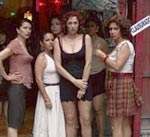 “Nuestro objetivo final es nada menos que lograr la integración del cine latinoamericano.
Así de simple, y así de desmesurado”.
“Nuestro objetivo final es nada menos que lograr la integración del cine latinoamericano.
Así de simple, y así de desmesurado”.
Gabriel García Márquez
Presidente (1927-2014)


-

Ripstein en SodomaPor Ana Bertha LunaBajo la dirección de Arturo Ripstein, El carnaval de Sodoma es una película que centra su trama en un burdel de mala muerte, el Royal Palace, testigo y cómplice de las historias y frustraciones de varios personajes derrotados por la existencia: un poeta erudito que nunca ha publicado un verso; un revolucionario que siempre llegó tarde a la historia; un ángel sin alas, provocador y masoquista, expulsado del cielo; un chino alucinado, propietario del burdel, seguido siempre por su silenciosa y fiel esposa china; una comparsa de prostitutas de dudosa sensualidad y lenguas mordaces, y un sacerdote anciano embarcado en sendas cruzadas por alcanzar su canonización y el cierre del lupanar. Erguida tras un manto de misterio, la esquiva y hermosa Princesa de Jade trastorna a los clientes más asiduos del Royal Palace, símbolo de la decadencia y de los sueños efímeros.
Sin duda el peso del apellido de este director es un motivo más que suficiente para mirar muy de cerca su nuevo trabajo. La estructura, aunque un poco parecida a la que tuviera El callejón de los milagros, tiene su propio mérito, pues enmarca a la perfección la psicología de cada personaje, con lo cual logra que el espectador se adentre en su depresivo y mediocre mundo de ficción.Dentro de los grandes logros del filme, podemos aplaudir la magnífica selección de actores, empezando por Ernesto Gómez Cruz y Fernando Luján (de quienes sus respectivas trayectorias hablan por sí solas), para terminar con Patricia Reyes Spíndola y Alejandro Camacho, a quien se le reconoce más por su trabajo en teatro y televisión, pero que en El carnaval de Sodoma demuestra su madera de actor.
Paz Alicia Garciadiego, guionista de cabecera de Ripstein, fue la encargada de hacer esta labor, basada en la novela homónima de Pedro Antonio Valdez, pero pone su propio estilo y la sal y pimienta que hace de la película un submundo inexistente. Aunque el título de la cinta hace referencia a una de las ciudades más conocidas por hundirse en el pecado de los excesos, entre ellos el sexo, es bastante gratificante ver que no solo el sexo vende y que todavía podemos decir que en México se puede hacer buen cine.
 Ripstein in Sodom
Ripstein in Sodom
By Ana Bertha Luna
Directed by Arturo Ripstein, El carnaval de Sodoma is a film that centers its plot in a seedy brothel, the Royal Palace, witness and accomplice of the stories and frustrations of several characters defeated by the existence: an erudite poet who has never published a poem, a revolutionary man who always came late to history, an angel without wings, provocative and masochistic, thrown out of heaven; a hallucinated Chinese, owner of the brothel, always followed by his silent and faithful Chinese wife; a parade of dubious sensuality prostitutes and dirty mouth, and an elderly priest embarked on two crusades: to reach his canonization and closing the brothel respectively. Standing behind a veil of mystery, the elusive and beautiful Jade Princess upsets the most regular customers of the Royal Palace, a symbol of decadence and ephemeral dreams.Undoubtedly the importance of the name of this director is enough to look very closely at his new work. The structure, although somewhat similar to that of the El callejón de los Milagros, has its own merit, since it perfectly frames the psychology of each character, which manages that the audience enters into its depressive and mediocre fictional world.
Among the great achievements of the film, we applaud the superb selection of actors, starting with Ernesto Gómez Cruz and Fernando Luján (whose acting careers speak for themselves), and ending with Patricia Reyes Spindola and Alejandro Camacho, who is more recognized for his work in the theater and television, but that in El carnaval de Sodoma demonstrates his great talent as an actor.
Paz Alicia Garciadiego, Ripstein’s favorite screenwriter, was commissioned to do this job, based on the homonymous novel by Pedro Antonio Valdez, but she adds her own style and seasoning that made of the film a non existent underworld. Although the title of the film refers to a city best known for falling into the sin of the excesses, which includes sex, is quite gratifying to see that not only sex sells and that we still could state that in Mexico it is possible to make good films.
(Fuente: www.larazon.com.mx)
















